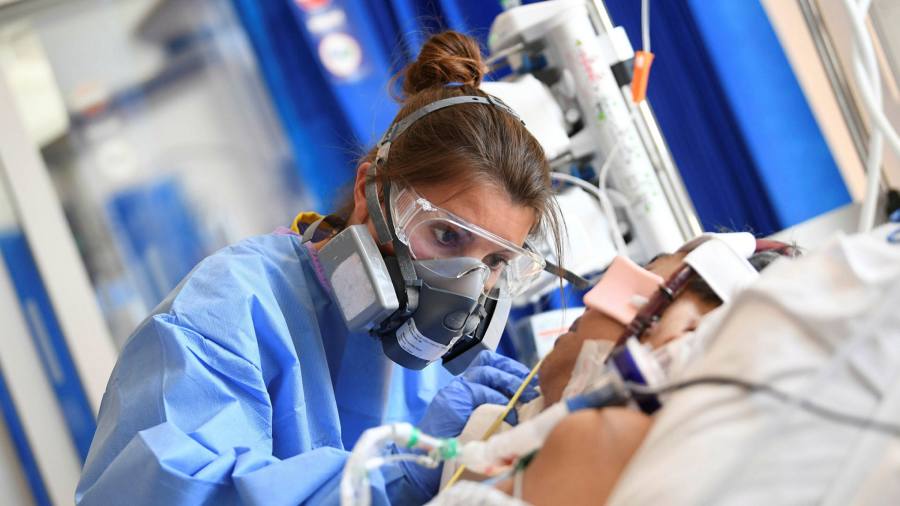[ad_1]
For consultancies that specialise in UK healthcare, the conventional maxim that Covid-19 has “changed everything†resonates with dual force.
The pandemic has not only created a need to help the taxpayer-funded NHS cope with an overwhelming surge in demand for care. It has also thrown up a more daunting conundrum: how to strengthen, for the long term, a badly underfunded health system whose fragilities have been all too apparent in the crisis.
Explaining this twin focus, Jason Parker, KPMG UK’s head of health, says it works with national bodies on Covid-related programmes, providing skills and expertise to supplement those in the civil service and NHS. He describes this as “targeted, specific support rather than mass consultancyâ€.
It also works alongside NHS Trusts and regions, helping on particular problems. While much of this is Covid-related, “it is also increasingly about life after Covid and repairing societyâ€, he says. Themes include clearing long waiting lists and equitable access to services regardless of income, ethnicity or geography. “The service on the ground now has half an eye to that, and what a ‘new normal’ will look like, and needs support thinking it through and delivering,†adds Parker.
Nitin Chaturvedi, a partner at Bain & Company, agrees that, alongside work supporting the NHS in the crisis, the pandemic has led to “a new and very energised debate on fixing the system fundamentallyâ€. He has seen an increasing focus on the hundreds of thousands of people in the NHS workforce. There is “a much greater understanding of their needs and what it would take to support them,†he says.
The overarching question beyond the recovery, he says, is how the UK can “aspire to deliver care on a par with other OECD [club of advanced economies] countries, maybe even become the [global] leader?â€
Healthcare consultancy in the UK goes beyond the NHS. Parker notes that KPMG works with private healthcare providers, advising how they can best use their resources to support national Covid-19 efforts. In the search for staff, space and equipment, the NHS has worked to an unprecedented degree with private hospitals, and he identifies “a genuine desire for a better relationship between public and private providersâ€.
However, the NHS commands the lion’s share of spending on health in the UK, making it a principal client for consultants — and rendering it all the more striking that so little is known about the total NHS expenditure in this area, according to two leading academics in the field.
Ian Kirkpatrick, chair in management at the University of York, and Andrew Sturdy, a professor of organisation and management at the University of Bristol, say this “remarkable†lack of easily accessible data is partly due to how expenditure is split across many organisations in a highly atomised health service.
The academics say hard evidence showing that consultants make a positive difference is elusive. In a 2018 study, Kirkpatrick, Sturdy and others examined 120 English hospital trusts over four years to discern the relationship between expenditure on consultants and efficiency, including levels of patient satisfaction.
They found the more trusts spent on consultants during that period, the more inefficient they became. “We found a statistically significant negative impact,†Kirkpatrick says. “We’re not saying you don’t need consultants, or they can’t provide value, but from an objective point of view [of] the evidence base, we have suggested they’re not adding much value in aggregate.â€
It was hard from the data to explain why that was, he says. “Is it a result of consultants providing the wrong advice, or managements not heeding the right advice, or because they were commissioned to work on a project that was never going to succeed in the first place? Perhaps a combination of all those things,†he adds.
The climate for employing consultants is possibly becoming more rigorous, however. Bain’s Chaturvedi says in the lead up to Covid, he saw “a growing focus on value and a clear need for consultants to put skin in the game and have their fees linked very clearly to well-defined and measurable outcomes [that are sustainable] . . . so there isn’t that reliance [on them], or a risk that when consultants are out, the results stopâ€.
Hailing a generation of NHS leaders that he views as deeply committed to improving the service, Chaturvedi adds: “There is a lot of really high quality talent in the health service, people not just focused on the year or the quarter, but on really long-term transformation and that’s heartening to see.â€
[ad_2]
Source link







